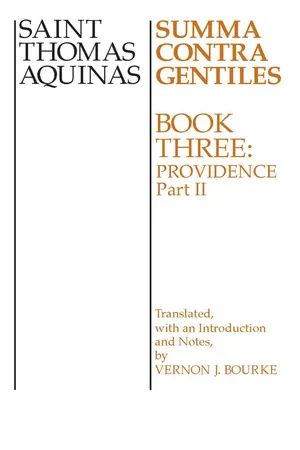Contents
PART II
Chapters 84–163
84. That the celestial bodies make no impression on our intellects
85. That the celestial bodies are not the causes of our acts of will and choice
86. That the corporeal effects in things here below do not necessarily result from the celestial bodies
87. That the motion of a celestial body is not the cause of our acts of choice by the power of its soul moving us, as some say
88. That separate created substances cannot be directly the cause of our acts of choice and will, but only God
89. That the movement of the will is caused by God and not only the power of the will
90. That human acts of choice and of will are subject to divine providence
91. How human events may be traced back to higher causes
92. How a person is favored by fortune and how man is assisted by higher causes
93. On fate: whether and what it is
94. On the certainty of divine providence
95. That the immutability of divine providence does not suppress the value of prayer
96. That some prayers are not granted by God
97. How the disposition of providence has a rational plan
98. How God can act apart from the order of His providence, and how not
99. That God can work apart from the order implanted in things, by producing effects without proximate causes
100. That things which God does apart from the order of nature are not contrary to nature
101. On miracles
102. That God alone works miracles
103. How spiritual substances do certain wonderful things which, however, are not truly miracles
104. That the works of magicians are not solely due to the influence of celestial bodies
105. Where the performances of the magicians get their efficacy
106. That the intellectual substance which provides the efficacy for magic works is not morally good
107. That the intellectual substance whose help the arts of magic use is not evil in its own nature
108. Arguments whereby it seems to be proved that there can be no sin in demons
109. That sin can occur in demons, and in what way
110. Answer to the previous arguments
111. That rational creatures are subject to divine providence in a special way
112. That rational creatures are governed for their own sakes, while others are governed in subordination to them
113. That the rational creature is directed by God to his actions not only by an ordering of the species, but also according to what befits the individual
114. That laws are divinely given to man
115. That the divine law principally orders man toward God
116. That the end of divine law is the love of God
117. That we are ordered by divine law to the love of neighbor
118. That through divine law men are bound to the right faith
119. That our mind is directed to God by certain sense objects
120. That the cult proper to latria is to be offered to God alone
121. That divine law orders man according to reason in regard to corporeal and sensible things
122. The reason why simple fornication is a sin according to divine law, and that matrimony is natural
123. That matrimony should be indivisible
124. That matrimony should be between one man and one woman
125. That matrimony should not take place between close relatives
126. That not all sexual intercourse is sinful
127. That the use of food is not a sin in itself
128. How man is ordered by the law of God in regard to his neighbor
129. That some human acts are right according to nature and not merely because they are prescr...
